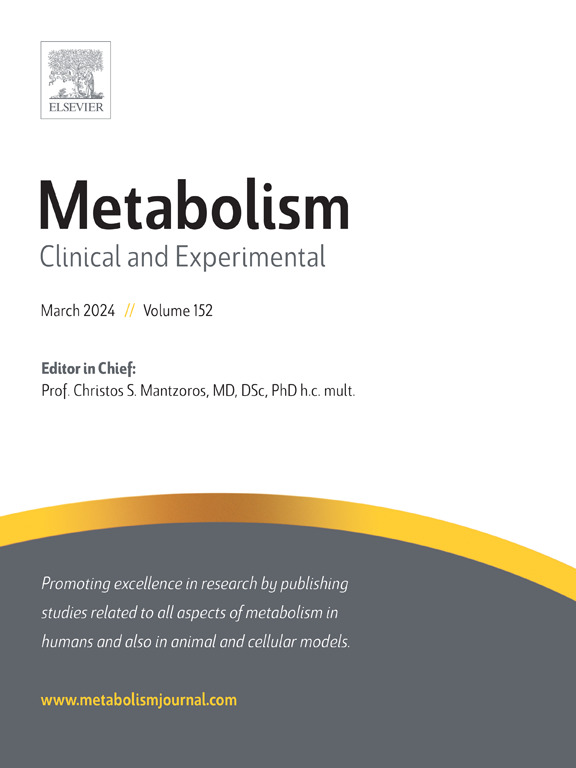l -犬尿氨酸激活AHR-PCSK9通路介导多囊卵巢综合征的脂质代谢和卵巢功能障碍。
IF 10.8
1区 医学
Q1 ENDOCRINOLOGY & METABOLISM
引用次数: 0
摘要
氨基酸代谢失调是多囊卵巢综合征(PCOS)的一个关键因素。这项横断研究显示,多囊卵巢综合征(PCOS)患者血清l -犬尿氨酸(L-Kyn)水平显著升高,而吡哆醛5'-磷酸(PLP)水平显著降低。此外,人血清L-Kyn水平与低密度脂蛋白胆固醇(LDL-C)呈正相关,与高密度脂蛋白胆固醇(HDL-C)负相关。此外,来曲唑(LET)诱导的pcos样小鼠肝脏L-Kyn水平升高。在机制上,体内和体外实验均表明,吲哚胺2,3-双加氧酶(IDO1)上调可激活pcos样小鼠肝脏芳烃受体(AHR) -蛋白转化酶枯草素/酮素9型(PCSK9)通路,从而导致血脂异常。用epacadostat(一种IDO1酶抑制剂,或PLP, L-Kyn分解代谢的辅助因子)治疗pcos样小鼠,有效地恢复卵巢功能,改善糖耐量,改善脂质异常。本文章由计算机程序翻译,如有差异,请以英文原文为准。
L-Kynurenine activates the AHR-PCSK9 pathway to mediate the lipid metabolic and ovarian dysfunction in polycystic ovary syndrome
Dysregulated amino acid metabolism is a key contributor to polycystic ovary syndrome (PCOS). This cross-sectional study revealed that serum levels of L-kynurenine (L-Kyn) were significantly elevated in women with PCOS, whereas pyridoxal 5′-phosphate (PLP) levels were markedly reduced. Moreover, human serum L-Kyn levels exhibited a positive correlated with low-density lipoprotein cholesterol (LDL-C) and a negative correlation with high-density lipoprotein cholesterol (HDL-C). Additionally, letrozole (LET) induced PCOS-like mice displayed increased hepatic L-Kyn levels. Mechanistically, both in vivo and in vitro experiments demonstrated that the upregulation of indoleamine 2,3-dioxygenase (IDO1) activates the aryl hydrocarbon receptor (AHR) - proprotein convertase subtilisin/kexin type 9 (PCSK9) pathway in the liver of PCOS-like mice, thereby contributing to dyslipidemia. Treatment with epacadostat, an inhibitor of the enzyme IDO1, or PLP, a cofactor for L-Kyn catabolism, effectively restored ovarian function, improved glucose tolerance, and ameliorated lipid profile abnormalities in PCOS-like mice.
求助全文
通过发布文献求助,成功后即可免费获取论文全文。
去求助
来源期刊

Metabolism: clinical and experimental
医学-内分泌学与代谢
CiteScore
18.90
自引率
3.10%
发文量
310
审稿时长
16 days
期刊介绍:
Metabolism upholds research excellence by disseminating high-quality original research, reviews, editorials, and commentaries covering all facets of human metabolism.
Consideration for publication in Metabolism extends to studies in humans, animal, and cellular models, with a particular emphasis on work demonstrating strong translational potential.
The journal addresses a range of topics, including:
- Energy Expenditure and Obesity
- Metabolic Syndrome, Prediabetes, and Diabetes
- Nutrition, Exercise, and the Environment
- Genetics and Genomics, Proteomics, and Metabolomics
- Carbohydrate, Lipid, and Protein Metabolism
- Endocrinology and Hypertension
- Mineral and Bone Metabolism
- Cardiovascular Diseases and Malignancies
- Inflammation in metabolism and immunometabolism
 求助内容:
求助内容: 应助结果提醒方式:
应助结果提醒方式:


